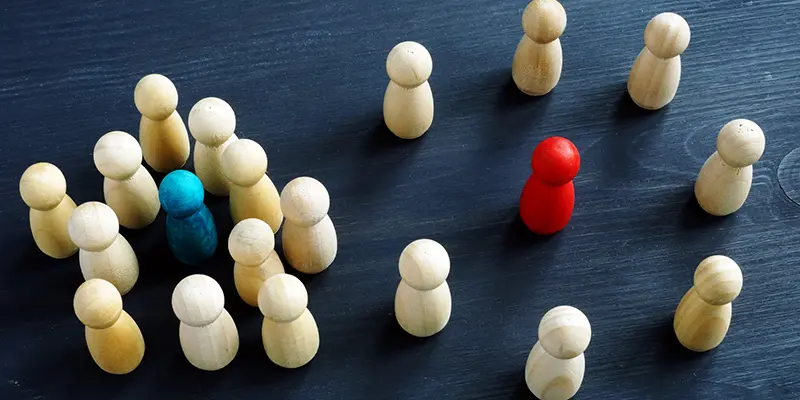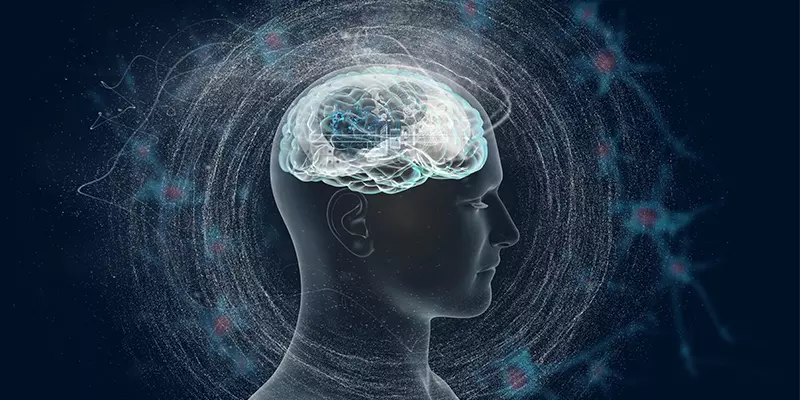
While American culture tends to love the extrovert—the outgoing, charismatic, confident, sociable personality—in recent years, the value of the focused, deep-thinking, quiet, listening introvert has gained favor. Unfortunately, negative stereotypes of both temperaments persist. Research is revealing that both extroverts and introverts have unique and valuable attributes that may largely be driven by genetics and brain function.
Research is revealing that both extroverts and introverts have unique and valuable attributes that may largely be driven by genetics and brain function. Click To Tweet
INTROVERSION, EXTROVERSION, AND BRAIN TYPES
Whether you have introverted or extroverted tendencies depends in part on your brain. After analyzing blood flow and activity patterns on more than 200,000 brain SPECT imaging scans, the team of psychiatrists at Amen Clinics has identified 5 primary brain types: Balanced, Spontaneous, Persistent, Sensitive, and Cautious. Several of these brain types are associated with attributes commonly seen in introversion and extroversion.
Introversion
Introverts are more likely to have the sensitive brain type (associated with being deeply feeling and empathic and having a tendency for low moods or depression) or the cautious brain type (associated with being prepared, risk-averse, and anxious). Brain SPECT imaging indicates that sensitive types have high activity in the limbic system, or emotional centers, of the brain, and cautious types have too much activity in the basal ganglia. An Amen Clinics study on the neurobiological underpinnings of introversion and extroversion also revealed higher levels of brain activity in introverts in several other brain regions, including the anterior cingulate gyrus, temporal lobes, and parietal lobes.
The parietal lobes are located in the top back part of the brain and are responsible for sensing the world. Sensory information—sights, sounds, scents, and so on—can be overwhelming and put introverts into sensory overload. Thus, introverts need alone time to decompress and re-energize. They need quiet to concentrate, are reflective, self-aware, take their time to make decisions, are comfortable in their own company, prefer to write than talk, may not like working in a group, and are drained after social activity or being in a crowd.
Extroversion
Extroverts are more likely to have the spontaneous brain type, which is associated with being adventurous and creative. SPECT scans show this brain type is associated with low activity in the prefrontal cortex (PFC). This mirrors the findings of Amen Clinics’ study mentioned above, which showed that extroverts had lower levels of overall brain activity, including reductions in the PFC. This brain type tends to run low in dopamine. Extroverts are drawn to activities (social, external reward, high sensory) that typically boost dopamine, but they may be impulsive and engage in risky behavior, such as drinking too much or participating in dangerous sports like free climbing. They are more prone to ADD/ADHD and addiction. An extrovert typically does not require a lot of alone time, thrives around people, enjoys wide social circles, prefers to talk out problems or questions, is outgoing and optimistic, and is not afraid to take a risk.
Research shows that these temperaments are strong and can last throughout one’s lifetime, indicating that they are likely rooted in the differential excitability of particular brain structures.
Let’s look more closely at what drives introversion and extroversion, and dispel the unhelpful myths that lack compassion and understanding.
DEBUNKING 4 MYTHS ABOUT INTROVERTS AND EXTROVERTS
Myth#1: Extroverts Are Attention-Seekers
Don’t be quick to judge an extrovert negatively. Extroverts may like being the center of attention, but it probably has more to do with brain function than self-centeredness. As mentioned above, extroverts tend to have a spontaneous brain type with low PFC activity and low dopamine. As such, they seek out external rewards that increase dopamine because they need more of it. Some research indicates that extroverts have more dopamine receptors in their brain and are therefore less sensitive to it, increasing their need for it to feel happy. Getting attention, quick action, risk-taking, seeking novelty, talking, and socializing – these increase dopamine and its “feel good” effects.
Myth#2: Introverts Make Poor Leaders
Because extroverts seek external rewards and are outgoing, sociable, charismatic, quick thinkers, and decision-makers, they are often placed in positions of leadership. Yet, introverts make great leaders, too – and sometimes even better leaders because of the different skills that they bring to the table – and, in part, this is due to brain function.
Unlike extroverts, research shows that the neural reward response in introverts is more sensitive to dopamine than in extroverts. In fact, one study that observed neural reward responses in extroverts and introverts found introverts had a much more measured response to dopamine. It may be why high-dopamine experiences put introverts on sensory overload. Hence, they crave activities and experiences that are calming.
Additionally, experts believe that their reward response comes from acetylcholine. Its effects are more subtle, which include relaxation, alertness, and contentment. Activities like reading that call for focus and engagement of the mind make introverts feel good. The acetylcholine reward response is believed to be more involved than that of dopamine. Researcher Dr. Marty Olsen Lani, who studies the physiology underlying introverted and extroverted temperaments, posits that this acetylcholine response pathway in introverts travels through several areas of the brain, which includes regions governing empathy, self-reflection, emotional meaning, detection of errors, planning, long-term memory storage, and more.
As a result, introverts have the ability to focus for long periods, balanced and critical thinking, empathy, and an ability to quietly empower others. These introverted attributes have shown sometimes greater business success than extroverts. An analysis of CEO performances published in the Harvard Business Review showed that more than half of the best-performing CEOs were actually introverts!
Myth#3: Introverts Are Shy, Afraid, and Don’t Like Social Situations
An introvert’s need to retreat, think, and be alone in order to restore and re-energize is often misunderstood. A study published in the Journal of Neuroscience found that introverts had a larger, thicker gray matter in their PFC, which is an area of the brain associated with abstract thought and decision-making. (Interestingly, this same area is thinner in extroverts.)
This indicates that an introvert’s brain has designated more neural resources to abstract thought. They are, by nature, deep thinkers. What appears to be shyness, fear, or dislike of social situations is in reality a need to quietly think things through or assimilate a situation. Introverts prefer to listen and quietly observe, which can also be misunderstood as shyness or social awkwardness.
Myth#4: You Are Either an Introvert or Extrovert
As humans, we love to categorize and think in absolutes. We label people as introverts or extroverts, period. But experts suggest that these temperaments are a continuum. We are likely to lean towards one or the other and have a mix of introverted/extroverted traits. Although some findings suggest that our temperament doesn’t change much throughout our lives, other research indicates that there’s a benefit to developing personality traits that do not come naturally. Introverts can bolster their happiness by participating in “extroverted” activities such as giving a presentation or socializing. Likewise, an extrovert can benefit by taking time to unwind and enjoy their own company for a time, to listen attentively, or to focus deeply on a problem. While our brain function and genetics may place us on either side of the introversion/extroversion continuum, research shows that developing both extroverted and introverted traits may be the recipe for success.
Introverts, extroverts, and those with both traits, all have valuable gifts to offer the world, as well as brain health vulnerabilities to overcome. Identifying your brain type and temperament can be helpful to your well-being.
Depression, anxiety, and other mental health issues can’t wait. At Amen Clinics, we’re here for you. We offer in-clinic brain scanning and appointments, as well as mental telehealth, clinical evaluations, and therapy for adults, teens, children, and couples. Find out more by speaking to a specialist today at 888-288-9834 or visit our contact page here.





Very interesting article. I found I am a combination of the two.
Comment by Donna Ann Reed — February 28, 2022 @ 4:23 AM
Thank you for this. I’ve experienced both intro and extro tendencies all my life, and never been totally either, for which I’m very grateful! It has blessed me especially in my life as a pastor, because I’m truly happy to meet and socialize with new people and truly happy, too, to be alone with myself. I have a high IQ, too, and these tendencies have both seemed to benefit me in all that I do. I’m grateful for this explanation.
Comment by Laura Trent — February 28, 2022 @ 4:35 AM
Very informative. Thank you.
Comment by Cheryl Johnson — February 28, 2022 @ 4:56 AM
Do you halp with test anxiety?
Comment by Teri — February 28, 2022 @ 6:41 AM
Are there supplements to help a introvert? Not be so sensitive
Comment by Robbin — February 28, 2022 @ 6:59 AM
Oh, Spring, spring forth singing birds!
I am a poet and find that at poetry meetings I am an extrovert and at home, I am half and half!!!
Comment by Catherine Parker — February 28, 2022 @ 7:04 AM
thank you Dr. Amen……………I have watched you on public television and really enjoy all that you share with us regarding our brain I believe it helps us have better relationships with those who share our lives.
Comment by JANET JOHNSON — February 28, 2022 @ 7:24 AM
Great article. Very interesting. I am an extrovert and my husband is an intervert.
The world needs both an God planed it that way.
Comment by Kathy Stockdale — February 28, 2022 @ 7:33 AM
I live all of your articles and believe you help lots of people because of them Thanks, God Bless You!
Comment by Pat — February 28, 2022 @ 7:50 AM
Thank you for the good summary…. useful in parent education !
Comment by sally shinn — February 28, 2022 @ 7:56 AM
I’m an introvert and this article that is so true of me has made me to better understand my life long behaviours and character traits.
It’s the best article on these topics that I have ever read and whilst I used to be embarrassed to be known as an introvert this article reveals
the exceptional strengths of one, which make me proud to be an introvert !
Comment by Sam Nelson — February 28, 2022 @ 8:08 AM
Yes,…ambiverts. ;-D
Comment by Fiona — February 28, 2022 @ 8:25 AM
Learning this is a GIFT @ my age; my church EXHAUSTS me from its Long hours Demands of meeting. This article Explains to me, why i get soo exhausted; i m both extro/intro-more toward intro. Ppl, friends, relatives Like me a LOT; thats blessing; BUT they disappointed w me; i exhaust when too many friends need me. thk u.
Comment by teresa baumgartner — February 28, 2022 @ 8:45 AM
While I always knew I was an introvert , this underscores why and how I view my inner and outer world.
Thank you!
Comment by Judith Romanello — February 28, 2022 @ 9:19 AM
Although I see myself as a combination of both, I have found that my experiences as a young child and teenager made me need to show more extrovertive behavior in order to get through difficult life situations. I am known as the life of the party, but I am totally drained mentally when I get home from the social situation. Again I think my upbringing and situation during my young And formative years had me show myself as more of an extrovert as a defense mechanism
Comment by Trudy — February 28, 2022 @ 10:52 AM
Great article I am an extroverted introvert
I love time alone so the pandemic has not been so hard but I find lots of auditory distractions difficult at work when I am on the phone or working on something that reaquires concentration
Comment by Michele — February 28, 2022 @ 11:05 AM
I have done some reading and what I learned is that people who have both traits are called ambiverts. That is who I am!!
Comment by Linda C Gendall — February 28, 2022 @ 11:06 AM
Yes, the studies with which I am familiar note that 15-16 percent of individuals are very extroverted; 15-16 percent of individuals are quite introverted, and the remaining individuals string out along a continuum with brains that are ambiverted — a mix of milder extroverted-introverted characteristics (with perhaps 50:50 in the center of the EAI Continuum). Absolutely this planet needs all types as each is gifted at doing activities that would be stressful for others. Howard, Pierce J., PhD. The Owner’s Manual for the Brain, has addressed this in his book. The individuals who have the most difficulty are, naturally, those at the ends of the continuum . I was very pleased to see this addressed here.
Comment by Arlene R. Taylor, PhD — February 28, 2022 @ 2:30 PM
Terrific article. People who know me from being a radio personality, or church circles, are disbelieving when I tell them I am an introvert. I am comfortable in the former being the microphone gives me permission to insert myself into a conversation, where I expect to be welcome. In my church life, I am “home” after 40 years in one congregation.
But if I am broadcasting on location for hours, I want to go home and not interact with anyone until I rest up. I’ve strengthened my extrovert muscles over 35 years in a public role, but I’m still a sensitive introvert.
If I’m visiting a church, I’ll stay after and chat with anyone who approaches me, but otherwise I hang back until I’m on my way.
Comment by Nanci Gordon — February 28, 2022 @ 8:20 PM
Interesting article. How does ADHD affect one’s intro/extrovertness? Or how does intro/extrovertness affect one who is ADHD?
Comment by Wendi — March 1, 2022 @ 3:21 AM
Thank you for sharing about this subject. It’s interesting to know that there is a physical condition that dictates our ability to process stimulation.
I think people use their tendencies toward introversion/extraversion as an excuse for their behavior around other people. These conditions are more about how a person gets/processes energy and Shouldn’t be an excuse to be rude or uncaring.
Comment by Janine — March 1, 2022 @ 4:36 AM
I want to respond to Trudy’s comment on 2/28 … I was thinking of writing something similar … in fact asking the question, can childhood experience skew our tendencies to be either more introvert or more extrovert as coping mechanisms? My way was to withdraw from chaos around me, and reading was my coping skill. I have few child hood memories. As I became an adult and matured in my emotions and reactions I find I am more of an introvert, that extrovert, but more of a balanced combination, rather that the totally withdrawn child I was. I still like to read, but not nearly as much … now it is for relaxation or information, not escape!
Comment by Cora Marandino — March 1, 2022 @ 12:22 PM
I have purposfully developed or strengthened both extroverted and introverted traits and I experientially agree it IS the recipe for success! I now experience my brain finally, as well integrated and balanced, whereas in the first half of my life it was lopsided. We are all on a continuum and behaviors, actions, beliefs etc. are dependent on where we are on that continuum. It is sad to me that most folks don’t know how to integrate their brains. If they could, there would be no violence and they would have no negative qualities, traits or behaviors. The key is brain development and understanding how emotional trauma in infancy or childhood throws off the natural balance and integration we are born with, baring any physical abnormalities.
Comment by Kaiven Fenton — March 1, 2022 @ 11:54 PM